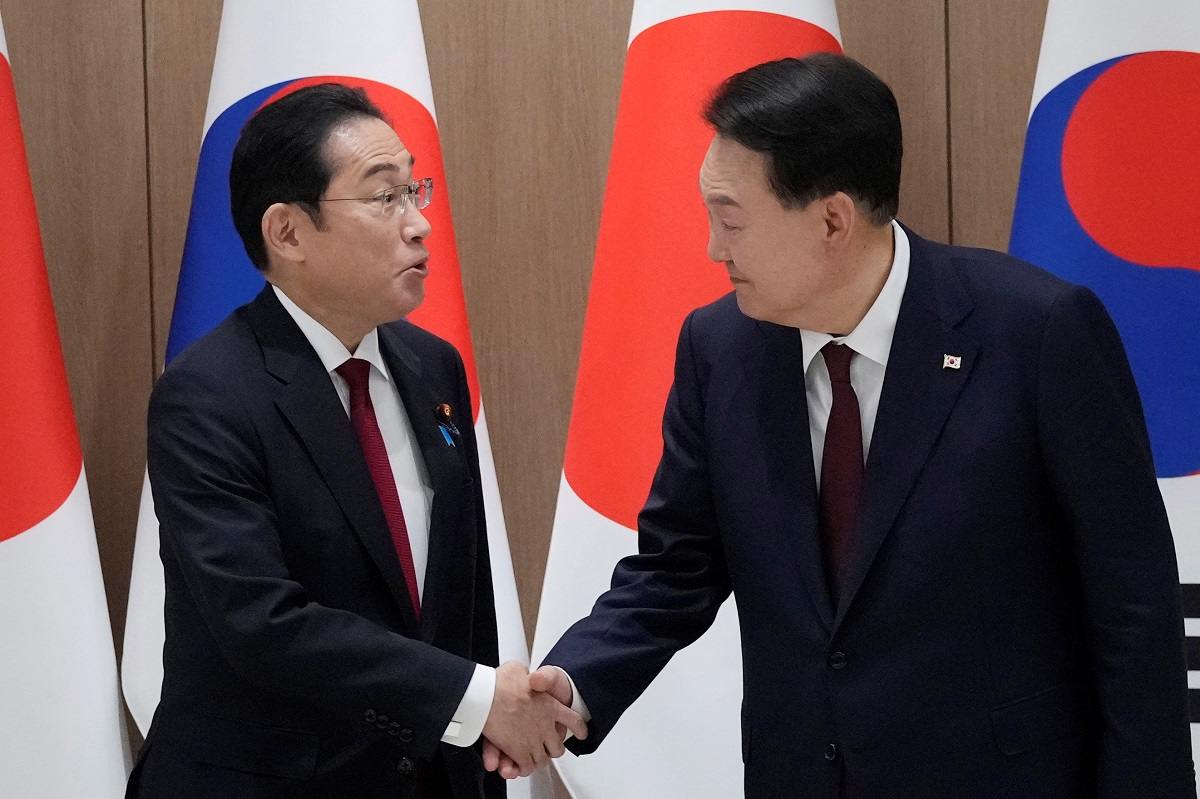Yoon’s Emphasis on Japan Reflects Public Opinion; Tokyo, Seoul Look Toward 60th Anniversary of Diplomatic Relations

Prime Minister Fumio Kishida, left, shakes hands with South Korean President Yoon Suk Yeol during a meeting at the Presidential Office in Seoul on May 26.
20:00 JST, June 11, 2024
SEOUL ― Against a backdrop of close diplomatic relations between Japan and South Korea, half of people in Japan and over 40% of people in South Korea evaluate Japan-South Korea relations as good according to a recent opinion poll.
South Korean President Yoon Suk Yeol, who places great importance on Japan, faces difficulties in managing his administration, and details of new cooperation agreements between the two countries will now be the focus of attention in light of the 60th anniversary of the normalization of diplomatic ties next year.
Compatibility of leaders
“Based on the strong trust between [Prime Minister Fumio Kishida and myself], bilateral exchanges have greatly expanded in various fields at various levels over the past year,” Yoon said when he met the prime minister for summit talks in Seoul on May 26.
Kishida and Yoon have met face-to-face 10 times and are regarded as the most compatible Japanese and South Korean leaders to date, according to a South Korean government source. Almost all diplomatic and economic bilateral talks, which had been suspended under the previous President Moon Jae-in administration, have resumed.
Yoon in March 2023 announced a solution to the issue regarding lawsuits against former wartime requisitioned workers, leading to the normalization of bilateral relations and the revival of reciprocal visits between leaders of the two countries. This was a top-down decision, overcoming the opposition of those around Yoon. He apparently deemed that improving relations with Japan was indispensable in the face of the severe security environment where North Korea pursues nuclear and missile development.
‘Humiliating diplomacy’
The conservative ruling People Power Party in April suffered a crushing defeat in the general election in South Korea, and leftist opposition parties such as the Democratic Party of Korea won nearly two-thirds of the seats in the National Assembly.
Nevertheless, Yoon’s stance of placing emphasis on Japan shows no sign of wavering. At a press conference in May, Yoon expressed his desire for the future-oriented development of Japan-South Korea relations. Opposition parties, however, have been conspicuous in their political use of Japan-related issues, such as by landing on the South Korean-controlled Takeshima Islands in Shimane Prefecture and criticizing Yoon’s actions toward Japan as “humiliating diplomacy.”
In the latest joint survey conducted by The Yomiuri Shimbun and South Korean newspaper Hankook Ilbo in late May, 42% of the respondents in South Korea said that the current state of the Japan-South Korean relationship was good. When this 42% is broken down by political orientation, 63% of conservatives who support Yoon said that the relations was good, followed by 41% of center-right and 23% of leftists, or progressives. The same trend was seen last year, showing that leftists who do not support Yoon are not happy about Japan-Korea relations.
The former wartime requisitioned workers issue between Japan and South Korea is ongoing. Some plaintiffs have refused to accept a solution in which a Seoul-related foundation pays an amount equivalent to compensation on behalf of Japanese companies, and the opposition is calling for the withdrawal of the solution.
The Japanese Internal Affairs and Communications Ministry earlier this year gave administrative guidance to LY Corp. ― operator of the Line messaging app ― to review its capital ties with large shareholder Naver Corp., a South Korean technology company, over breaches of personal information of app users. The ministry’s measure ignited backlash from South Korea’s opposition parties, who called it an “invasion of cyber territory.” The opposition parties are pressuring the Yoon administration to take a stronger stance against Japan.
Future-oriented relations
Yoon has about three years remaining of his term in office, drawing concern that a change of administration could lead to a major shift in policy toward Japan.
Tokyo, Seoul and academics have begun to explore ways to further deepen bilateral cooperation on the occasion of the 60th anniversary of the normalization of diplomatic ties next year.
There is a proposal, mainly from the Seoul side, that a new joint document be released, aiming to improve the contents of the then future-oriented 1998 Japan-Republic of Korea Joint Declaration signed by then Prime Minister Keizo Obuchi and then President Kim Dae Jung.
There are also proposals aimed to help people of the two countries realize the benefits of improved relations, such as allowing them to travel between the two countries without passports and allowing the use of each other’s IC transportation cards in both countries.
South Korea was the most popular overseas destination for Japanese tourists in 2023, with 2.32 million visitors. Likewise, Japan was the most popular overseas destination for South Korean tourists that year, with about 6.96 million visitors.
Choi Eunmi, a research fellow at the Asian Institute for Policy Studies in South Korea, said that next year would be a milestone year and that the two countries “should draw a vision for Japan and South Korea 20 to 30 years into the future.”
Top Articles in Politics
-

Japan PM Takaichi’s Cabinet Resigns en Masse
-

Sanae Takaichi Elected Prime Minister of Japan; Keeps All Cabinet Appointees from Previous Term
-

Japan’s Govt to Submit Road Map for Growth Strategy in March, PM Takaichi to Announce in Upcoming Policy Speech
-

LDP Wins Historic Landslide Victory
-

LDP Wins Landslide Victory, Secures Single-party Majority; Ruling Coalition with JIP Poised to Secure Over 300 seats (UPDATE 1)
JN ACCESS RANKING
-

Producer Behind Pop Group XG Arrested for Cocaine Possession
-

Japan PM Takaichi’s Cabinet Resigns en Masse
-

Man Infected with Measles Reportedly Dined at Restaurant in Tokyo Station
-

Israeli Ambassador to Japan Speaks about Japan’s Role in the Reconstruction of Gaza
-

Videos Plagiarized, Reposted with False Subtitles Claiming ‘Ryukyu Belongs to China’; Anti-China False Information Also Posted in Japan


























